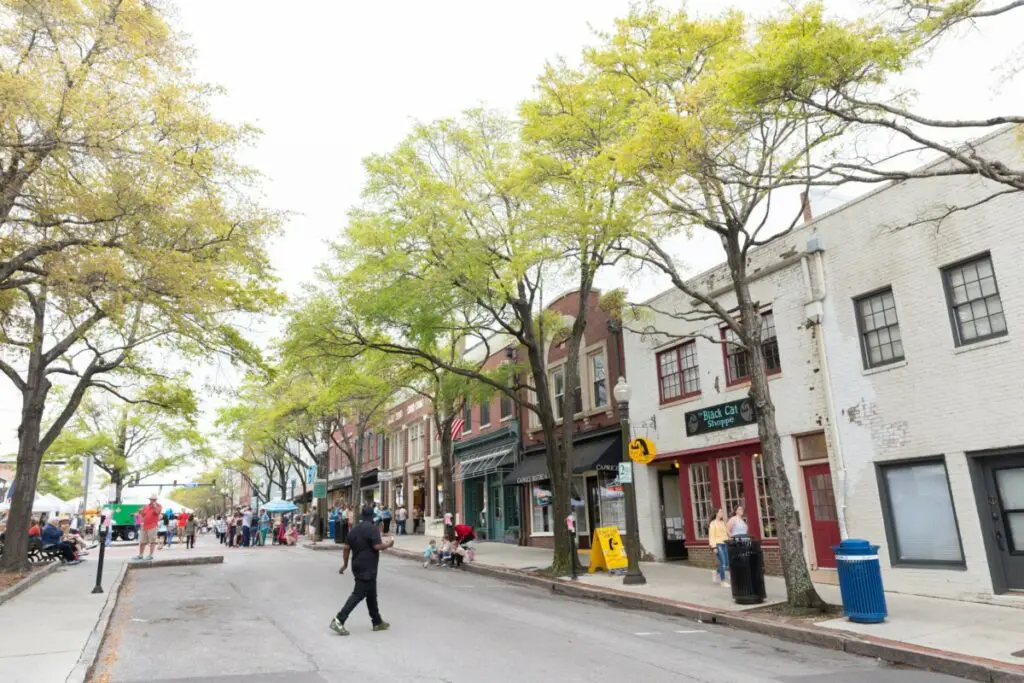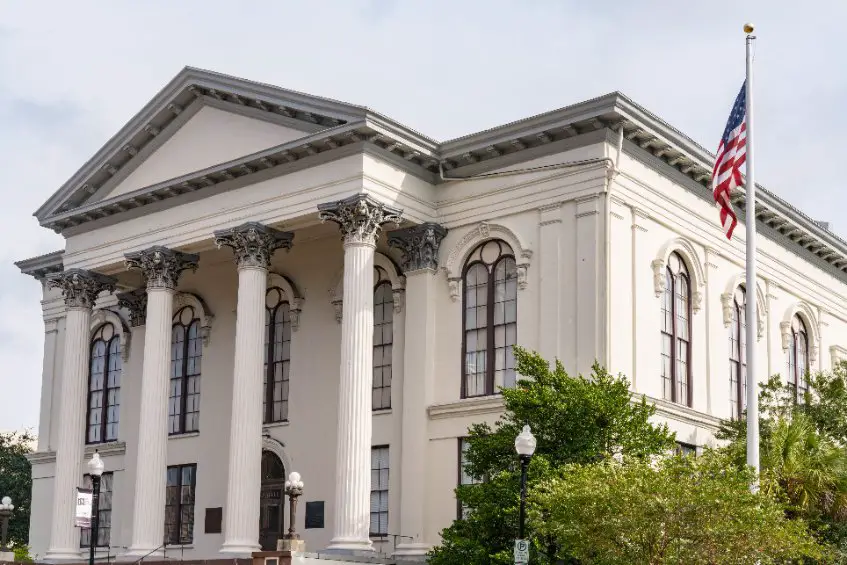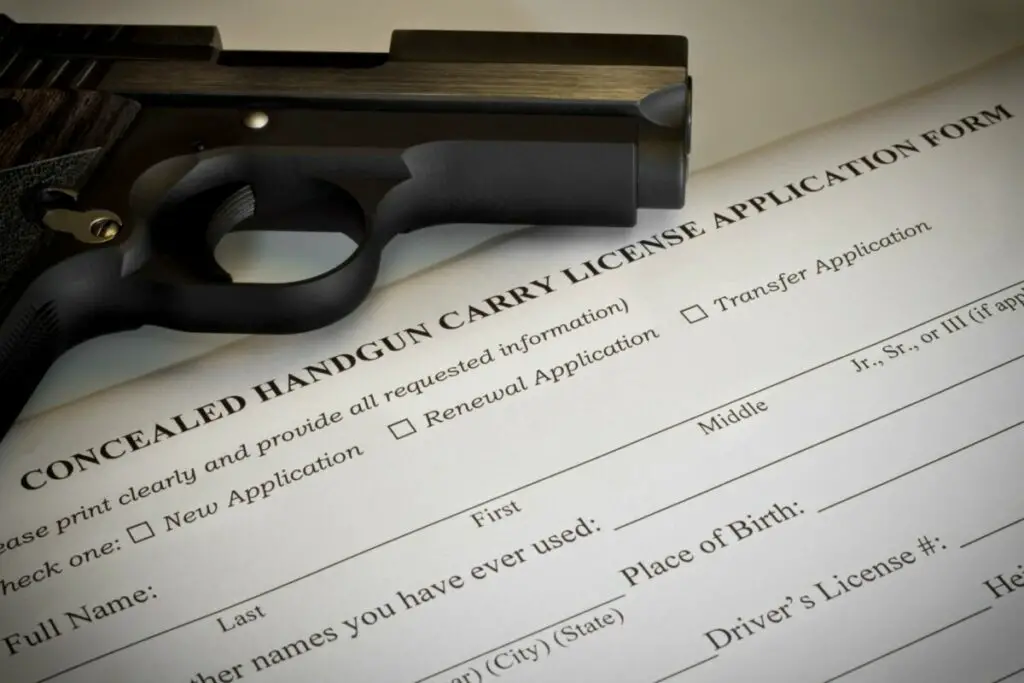
Home of the famous Outer Banks and the beautiful Cape Fear River, Wilmington, North Carolina is the perfect coastal town. Wilmington, North Carolina, better known as the Port City, has beautiful scenic rivers, beaches, and streets. Willmington is the perfect mix of beach town and charm. But what are the political views of the residents?
Wilmington, North Carolina is not a conservative city because of the Democratic state and local governments, the high tax laws, restrictive gun laws, and the small religious community. Despite lacking conservative influence, Wilmington is one of the best places for people of any political opinion.
Over the last 50 years, North Carolina has voted almost exclusively for the Republican candidate. Apart from maybe one or two elections, North Carolina has been a republican state. Keep reading to learn more about Wilmington’s political trends.
has voted almost exclusively for the Republican candidate. Apart from maybe one or two elections, North Carolina has been a republican state. Keep reading to learn more about Wilmington’s political trends.
Tax Laws
When tax season rolls around, there can be a lot of shock at how expensive things can be. However, that is not the case for those living in Wilmington. Far beneath the National average, Wilmington has a small combined tax rate that will still leave you living comfortably. Wilmington, North Carolina has a combined tax rate of 7%.
This is broken down into 4.75% sales tax for the state of North Carolina, 2.25% sales tax for New Hanover County, and then 0% for the city of Wilmington. This low tax rate
for the state of North Carolina, 2.25% sales tax for New Hanover County, and then 0% for the city of Wilmington. This low tax rate helps individuals save money and use what money they do have on necessary things.
helps individuals save money and use what money they do have on necessary things.
Starting in 2014, North Carolina issued a Flat Tax Income rate for everyone in North Carolina. While income tax used to follow a graduated system in 2013, 2014 brought income rates down to 5.8%. Since that point, North Carolina has worked the flat income tax rate down to 5.25%. The goal of lowering income tax rates will end in 2027 with rates as low as 3.99%. The current flat income tax rate for the year 2022 currently sits at 4.9%, and officials and residents hope that it will lower further in the future.
Income rate for everyone in North Carolina. While income tax used to follow a graduated system in 2013, 2014 brought income rates down to 5.8%. Since that point, North Carolina has worked the flat income tax rate down to 5.25%. The goal of lowering income tax rates will end in 2027 with rates as low as 3.99%. The current flat income tax rate for the year 2022 currently sits at 4.9%, and officials and residents hope that it will lower further in the future.
State and Local Government

Local Government
Since 2007, Mayor Bill Saffo has been the active Mayor of Wilmington, North Carolina. For 7 elections, Bill Saffo has helped create the Wilmington we know and love today. Mayor Saffo was born and raised in Wilmington, North Carolina and throughout his whole life, he couldn’t get away.
has been the active Mayor of Wilmington, North Carolina. For 7 elections, Bill Saffo has helped create the Wilmington we know and love today. Mayor Saffo was born and raised in Wilmington, North Carolina and throughout his whole life, he couldn’t get away.
He loved Wilmington, received his higher education there, and then continued to pursue real estate in the area. Being a true Wilmington native, Mayor Saffo knows the ins and outs of the town and has seen Wilmington grow and develop over the years. Over the last 15 years, Mayor Saffo has worked to improve many elements of Wilmington.
Being affiliated with the Democratic party, Mayor Saffo already holds values and ideas that he feels will better the community. Over the last year and in some of his latest City Council meetings, Mayor Saffo has addressed and emphasized the following areas:
- Economic Development
- Plans for Using Federal Stimulus Money
- Affordable Housing Plans
- Inclusion and Equity
- A New Development Code
- How to Deal with Gang-Related Crimes in the City
As Mayor Saffo has been in office he has been able to condense these issues into three main categories: Public Safety, Affordable Housing, and Environment. Mayor Saffo has taken this focus and helped improve the community of Wilmington by increasing the housing budget to accommodate the needs and personal budgets of those seeking housing. He has also issued several tree-planting operations on public and private land. Mayor Saffo has also worked to implement new technology to increase the safety of the public, residents, and tourists.
State Government
The Governor of North Carolina, Roy Cooper has been in office since 2017. Following his re-election, Governor Cooper has worked to serve the people of North Carolina and get them the resources that they need. Governor Cooper was born and raised in Nash County, North Carolina.
has been in office since 2017. Following his re-election, Governor Cooper has worked to serve the people of North Carolina and get them the resources that they need. Governor Cooper was born and raised in Nash County, North Carolina.
After practicing law for over 18 years, Governor Cooper has a passion for public service. He became involved in the House of Representatives and the Senate prior to running for governor. Since becoming governor, Roy Cooper has had a vision for North Carolina and has worked tirelessly to make it a reality. Governor Cooper has an 8-part vision to ensure North Carolina achieves all of its potentials.
Governor Cooper’s priorities include:
- Building an Economy that works for everyone
- Supporting Schools, Teachers, and Students
- Slowing the Spread of Coronavirus and Protecting Lives
- Building a Healthier North Carolina
- Protecting the Environment
- Supporting Military and Veteran Communities
- Creating Thriving Communities
- Building an Infrastructure for the 21st Century
With these Priorities in place, Governor Cooper has been able to advance and improve each of these areas in the state of North Carolina. Much like Mayor Saffo, Governor Cooper’s Democratic background gives him value and ideals. Governor Cooper pushes for the things he believes in and has helped North Carolina see progression and improvement.
Beyond Governor Cooper, North Carolina is issued 120 members of the House of Representatives . This is broken down into 69 members of the Republican party and 51 affiliated with the Democratic party. The Speaker of the House is Timothy K. Moore (R) with Majority Leader John Bell (R) and Minority Leader John Reeves (D).
. This is broken down into 69 members of the Republican party and 51 affiliated with the Democratic party. The Speaker of the House is Timothy K. Moore (R) with Majority Leader John Bell (R) and Minority Leader John Reeves (D).
Additionally, North Carolina has 50 members of the Senate. 58 are affiliated with the Republican party and leaving 22 involved with the Democratic party. The President of the Senate is Mark Robinson (R) with Majority Leader Kathy Harrington (R) and Minority Leader Dan Blue (D).
is Mark Robinson (R) with Majority Leader Kathy Harrington (R) and Minority Leader Dan Blue (D).
Gun Laws

With the state of North Carolina being predominantly Democratic, strict gun laws were sure to follow. North Carolina has in place “shall issue” policies in regard to gun possession. A Shall Issue gun policy means that if an individual wish to obtain a firearm, or obtain a permit to carry a firearm, they must complete a permit form and they shall be issued a permit if they meet all of the requirements.
were sure to follow. North Carolina has in place “shall issue” policies in regard to gun possession. A Shall Issue gun policy means that if an individual wish to obtain a firearm, or obtain a permit to carry a firearm, they must complete a permit form and they shall be issued a permit if they meet all of the requirements.
When purchasing a firearm, a purchase permit must be presented. To get a purchase permit, an application must be completed. During the application, questions such as intent and reasoning for purchase must be revealed. After the application is completed, it can take up to 30 days for your application to finish processing and be approved or denied.
In North Carolina, it is legal to openly carry a firearm. However, there are still restrictions. Every school premises, government building, and even some streets and businesses prohibit carrying firearms in the area. Gun restrictions vary between counties which can create some inconsistency across the state.
When it comes to carrying a concealed weapon, residents of North Carolina must obtain a North Carolina Concealed Handgun Permit (CHP). This permit requires that individuals attend a firearm course approved by the state. This ensures that individuals are familiar with proper handling skills, and safety protocols. Once the permit is issued, residents may conceal their firearms. Non-North Carolina residents may also conceal carry as long as they have valid Identification and permits issued by their state.
Religion
Unlike its neighbors in the South, North Carolina does not have the same southern religious drive. While religion carries some states and acts as a moral foundation, North Carolina uses other judgments and morals to guide it. North Carolina has a 48.9% religious rate.
This religious rate is exactly even to the religious rate in Wilmington. Wilmington, North Carolina has a religious rate of 48.9% with 14.5% being Baptist and 8.5% being Methodist. The other 25.9% of residents that are religious are part of other religions. These religions help to create diversity in the state. The religious charm adds perspective and virtue to the standards.
Baptist
With over 20 churches in the Wilmington area, Baptists have nothing short of a beautiful chapel to worship in each Sunday. Making up 14.5% of the religious population, Baptists account for the highest religious group. Baptists believe and rely on God’s love for them and on God’s power to save them from their shortcomings.
With church services that teach through songs of praise, scriptural sermons, offerings, and holy prayer, members are able to become closer followers of God. Baptist services run 30 minutes to 1 hour long and are available to all who are willing to attend.
Methodist
Methodists follow Baptists and are the second largest religious group in Wilmington, North Carolina. The Methodist religion is 8.5% of the total religious population found there. With church services ranging from 45 minutes to 1 hour, members and visitors are welcome and able to grow closer to God and strengthen their relationship with him. Methodists focus on a personal and specific relationship with God and how he can have a direct impact on their life. Methodists have over 20 chapels in the Wilmington area and meet each Sunday to worship.
While religion may not always be at the forefront of their mind, the people of North Carolina are still rich with perspective. Even many government leaders have spoken openly about their religious background and how that has shaped them into who they are today. Wilmington’s Mayor Bill Saffo himself has a very rich Greek Orthodox past coming from generations of faithful Greek Orthodox members.
Related Topics:
If you like the article above, here are some other similar articles you should check out!
Is there Public Transportation in Raleigh, North Carolina?
